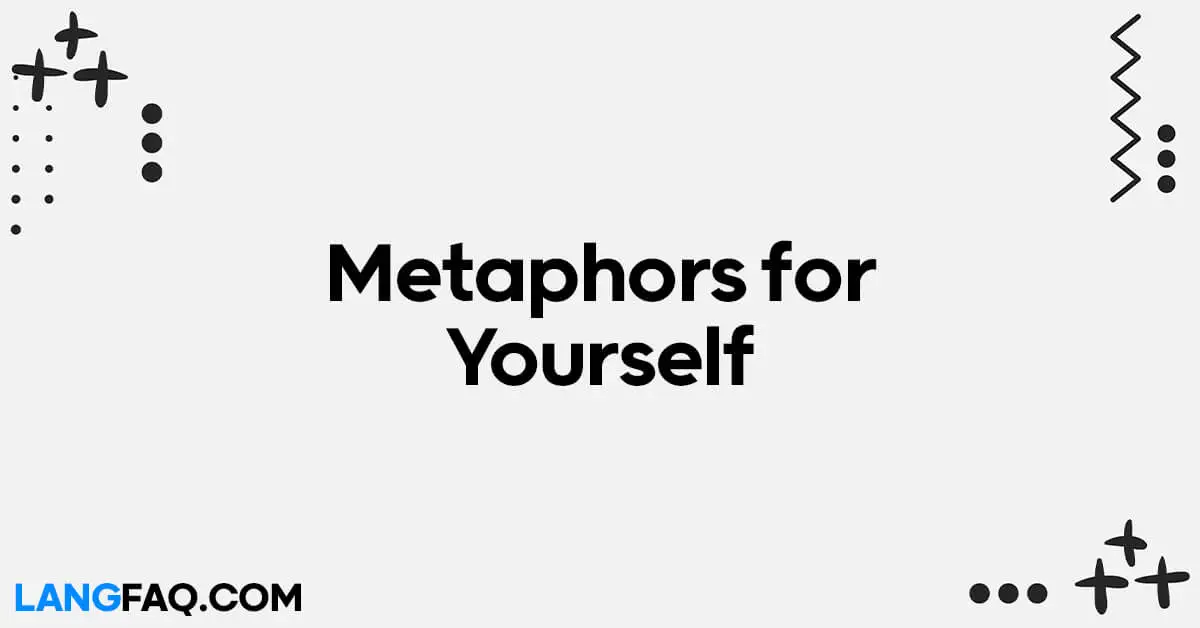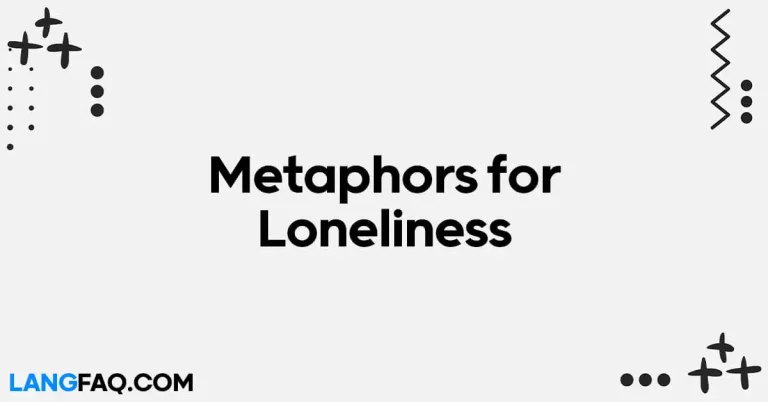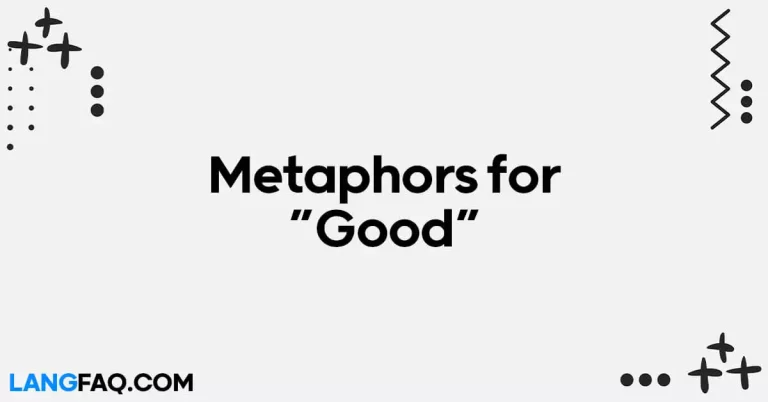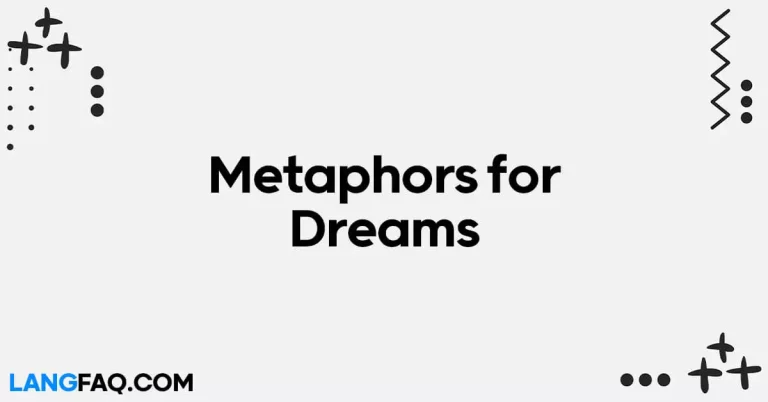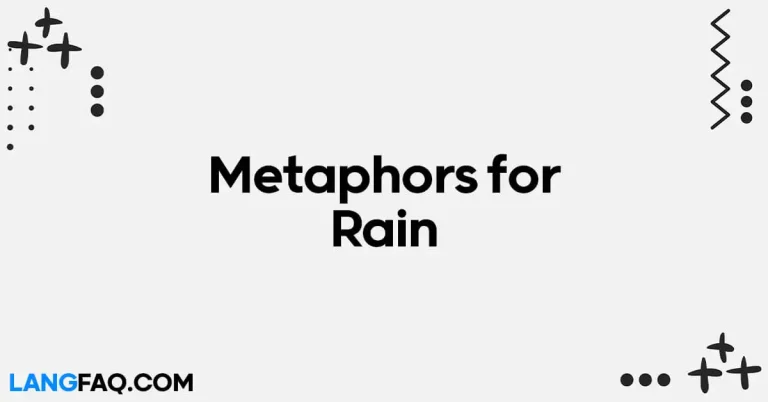Embracing one’s identity is a journey of self-discovery, and what better way to embark on this quest than through metaphors? In this article, we delve into the intriguing world of “26 Metaphors for Yourself,” unveiling unique perspectives that mirror the essence of who you are.
26 Metaphors for Yourself
- Explorer of Life’s Vast Oceans: Navigating the unknown with curiosity and courage.
- Gardener of Dreams: Cultivating aspirations like delicate flowers in a thriving garden.
- Architect of Ambitions: Designing the blueprint for a future filled with accomplishments.
- Sculptor of Character: Shaping the essence of personality with every choice and experience.
- Puzzle Solver: Piecing together the complexities of life with resilience and adaptability.
- Eternal Learner: Embracing knowledge and growth as a perpetual student of life.
- Warrior of Resilience: Facing challenges with strength and bouncing back from adversity.
- Weaver of Stories: Crafting a narrative through experiences that define the journey.
- Phoenix of Transformation: Rising from setbacks with renewed strength and purpose.
- Time Traveler: Navigating the past, present, and future with mindfulness and reflection.
- Dancer in the Rain: Finding joy and resilience in the midst of life’s unpredictable storms.
- Mountain Climber of Challenges: Scaling the heights of obstacles and conquering personal peaks.
- Harbor of Hobbies: Seeking solace and fulfillment in the pursuit of personal passions.
- Composer of Compassion: Creating a melody of empathy in interactions with others.
- Mirror of Reflection: Examining oneself honestly and embracing personal growth.
- Navigator of Dreams: Steering the ship of aspirations towards the shores of fulfillment.
- Artist of Authenticity: Painting life’s canvas with genuine emotions and actions.
- Lighthouse of Guidance: Providing direction and illumination to those around with wisdom.
- Nomad of Experience: Embracing diverse experiences as a traveler in the journey of life.
- Captain of Convictions: Guiding life’s ship with unwavering principles and beliefs.
- Juggler of Responsibilities: Balancing various roles and obligations with finesse.
- Scientist of Self-Discovery: Experimenting with life’s possibilities and learning from every outcome.
- Chef of Creativity: Cooking up innovative ideas and solutions in the kitchen of imagination.
- Photographer of Memories: Capturing precious moments and building a rich album of life.
- Ambassador of Positivity: Spreading optimism and kindness as a beacon of positivity.
- Navigator of Identity: Charting the course of personal identity with curiosity and self-awareness.
| Metaphor | Meaning | Example |
|---|---|---|
| Explorer of Life’s Vast Oceans | Navigating the unknown aspects of life with curiosity and courage. | Facing new challenges at work is like being an explorer on uncharted seas. |
| Gardener of Dreams | Cultivating and nurturing aspirations as one would tend to a garden. | She diligently tends to her career, treating it like a cherished garden. |
| Architect of Ambitions | Designing a blueprint for a future filled with accomplishments and goals. | His ambitious plans for the project showcase his role as an architect. |
| Sculptor of Character | Shaping the essence of personality through choices and experiences. | Overcoming adversity has sculpted her character into one of resilience. |
| Puzzle Solver | Piecing together the complexities of life with resilience and adaptability. | Facing the challenges of a new job is like solving a intricate puzzle. |
| Eternal Learner | Embracing knowledge and growth as a perpetual student of life. | Being an eternal learner, she seeks to acquire new skills every year. |
| Warrior of Resilience | Facing challenges with strength and bouncing back from adversity. | Despite setbacks, he remains a warrior of resilience in every trial. |
| Weaver of Stories | Crafting a narrative through experiences that define the journey. | Her life experiences weave together to form a compelling story. |
| Phoenix of Transformation | Rising from setbacks with renewed strength and purpose. | Like a phoenix, he emerged stronger after each personal crisis. |
| Time Traveler | Navigating the past, present, and future with mindfulness and reflection. | Reflecting on past mistakes, she embodies the role of a time traveler. |
| Dancer in the Rain | Finding joy and resilience in the midst of life’s unpredictable storms. | Embracing challenges with a positive spirit is akin to dancing in the rain. |
| Mountain Climber of Challenges | Scaling the heights of obstacles and conquering personal peaks. | Each challenge she faces is like climbing a new mountain in her life. |
| Harbor of Hobbies | Seeking solace and fulfillment in the pursuit of personal passions. | His garden is a harbor of hobbies, where he finds peace and joy. |
| Composer of Compassion | Creating a melody of empathy in interactions with others. | She approaches relationships with a composer’s touch of compassion. |
| Mirror of Reflection | Examining oneself honestly and embracing personal growth. | Self-reflection serves as a mirror, revealing areas for improvement. |
| Navigator of Dreams | Steering the ship of aspirations towards the shores of fulfillment. | Setting and achieving goals is navigating the ship of dreams. |
| Artist of Authenticity | Painting life’s canvas with genuine emotions and actions. | Living authentically is like being an artist creating a masterpiece. |
| Lighthouse of Guidance | Providing direction and illumination to those around with wisdom. | As a mentor, he serves as a lighthouse, guiding others with insight. |
| Nomad of Experience | Embracing diverse experiences as a traveler in the journey of life. | He views life as a nomad, collecting experiences from every corner. |
| Captain of Convictions | Guiding life’s ship with unwavering principles and beliefs. | She is the captain of her convictions, steadfast in her values. |
| Juggler of Responsibilities | Balancing various roles and obligations with finesse. | Managing work and family is a delicate act, like a skilled juggler. |
| Scientist of Self-Discovery | Experimenting with life’s possibilities and learning from every outcome. | Embracing change, she approaches life as a scientist of self-discovery. |
| Chef of Creativity | Cooking up innovative ideas and solutions in the kitchen of imagination. | In his profession, he acts as a chef, serving creativity on a platter. |
| Photographer of Memories | Capturing precious moments and building a rich album of life. | Documenting family events, she’s the photographer of cherished memories. |
| Ambassador of Positivity | Spreading optimism and kindness as a beacon of positivity. | Even in challenging times, she remains an ambassador of positivity. |
| Navigator of Identity | Charting the course of personal identity with curiosity and self-awareness. | Through introspection, he acts as a navigator, understanding his identity. |
These examples illustrate how each metaphor provides a unique lens through which to view and understand various aspects of personal identity and experiences.
Sailing the Seas of Self-Discovery: Explorer of Life’s Vast Oceans
Embarking on the journey of self-discovery is akin to sailing the vast oceans of life. As an Explorer of Life’s Vast Oceans, you navigate uncharted territories with curiosity and courage, embracing the unknown. Just like a seasoned explorer, you approach challenges as opportunities for growth and learning.
Usage Insights: Formal Context: In professional settings, adopting the role of an Explorer of Life’s Vast Oceans can be used to express openness to new projects and challenges. For example, in an email to a colleague:
Dear Team,
I am excited about the upcoming project and ready to navigate the seas of challenges as we explore innovative solutions together.
Informal Context: In personal relationships, this metaphor can be used to convey a sense of adventure and shared exploration. For instance, in a conversation with a friend:
Friend: How are you handling the changes at work? You: Oh, I see it as an opportunity to sail the seas of new experiences and broaden my horizons.
Grammar/Usage Tip: When using this metaphor, ensure consistency in your narrative. Describe challenges as waves to navigate and successes as islands discovered on your voyage.
Pros and Cons: Pros:
- Inspires a positive and adventurous mindset.
- Conveys resilience in the face of challenges.
Cons:
- May sound metaphorical in overly formal or technical contexts.
Cultivating Aspirations: Gardener of Dreams
Much like a gardener tends to a garden, the metaphor of Gardener of Dreams involves cultivating and nurturing aspirations with care and dedication. Your dreams are the delicate flowers in the garden of your life, requiring attention, patience, and a nurturing environment to blossom.
Usage Insights: Professional Context: Expressing your commitment to professional growth can be framed using this metaphor. For example, in a performance review discussion with a manager:
Manager: How do you envision your career growth in the next year? You: I see myself as a Gardener of Dreams, carefully nurturing my skills and taking on challenging projects to help my career flourish.
Personal Context: In personal development conversations, you can use this metaphor to discuss life goals with a mentor:
Mentor: What are your long-term goals? You: I’m acting as a Gardener of Dreams, cultivating my aspirations step by step, aiming for a fulfilling and meaningful life.
Grammar/Usage Tip: Ensure consistency in using gardening-related language. Discuss the “soil” of opportunities and the “watering” of skills to reinforce the metaphor.
Pros and Cons: Pros:
- Invokes a sense of responsibility for personal growth.
- Encourages a mindful and deliberate approach to aspirations.
Cons:
- Might be perceived as too whimsical in highly formal contexts.
Blueprint for Success: Architect of Ambitions
In the architectural realm, the metaphor of Architect of Ambitions involves designing a detailed blueprint for a future filled with accomplishments and goals. As an architect, you carefully plan and construct the building blocks of your success.
Usage Insights: Corporate Context: Discussing your career aspirations in a professional setting can be framed using this metaphor. For instance, in a job interview:
Interviewer: Where do you see yourself in five years? You: I’ve been working as an Architect of Ambitions, crafting a detailed plan for my career growth, and I see this role aligning perfectly with that blueprint.
Entrepreneurial Context: Entrepreneurs can leverage this metaphor to convey their strategic approach to business. In a business proposal:
Dear Investors,
I present to you the blueprint for success as the Architect of Ambitions for our startup, outlining the steps to achieve our goals.
Grammar/Usage Tip: Ensure clarity in articulating the elements of your blueprint, such as goals, timelines, and milestones.
Pros and Cons: Pros:
- Communicates a strategic and goal-oriented mindset.
- Emphasizes the importance of planning for success.
Cons:
- May sound too formal in casual conversations.
Sculpting Identity: Sculptor of Character
Just as a sculptor molds a piece of clay into a work of art, the metaphor of Sculptor of Character involves shaping the essence of one’s personality through choices and experiences. Your life experiences are the chisel and hammer that carve the sculpture of who you are.
Usage Insights: Professional Development: In a professional development context, discussing personal growth and character development can be framed using this metaphor. For instance, during a team-building workshop:
Facilitator: How have your experiences shaped your leadership style? You: I see myself as a Sculptor of Character, using every experience as a tool to refine and shape my leadership identity.
Personal Reflection: In personal reflections or conversations with a mentor, you can delve into the metaphor to discuss challenges and growth:
Mentor: How do you handle setbacks? You: I approach setbacks as a Sculptor of Character, understanding that every challenge is an opportunity to refine and improve myself.
Grammar/Usage Tip: Ensure consistency in using sculpting-related language. Discuss the “materials” of experiences and the “sculpting process” to reinforce the metaphor.
Pros and Cons: Pros:
- Highlights the transformative power of experiences.
- Emphasizes the active role in shaping one’s character.
Cons:
- Might be perceived as too metaphorical in highly technical or formal settings.
Piecing Together Life: Puzzle Solver
Much like solving a puzzle, life presents a myriad of complexities that require resilience, adaptability, and problem-solving skills. The metaphor of Puzzle Solver involves navigating through life’s challenges as if piecing together an intricate puzzle.
Usage Insights: Problem-Solving in Professional Context: Discussing your approach to challenges in a work setting can be framed using this metaphor. For example, during a team meeting:
Colleague: How do you approach complex projects? You: I see myself as a Puzzle Solver, breaking down complex tasks into manageable pieces and solving them methodically.
Personal Development: In personal development conversations, you can use this metaphor to discuss overcoming personal challenges:
Friend: How do you handle stress? You: I approach stress like a Puzzle Solver, breaking down the issues into smaller parts and addressing them one by one.
Grammar/Usage Tip: Emphasize the systematic approach to problem-solving, mirroring how one would approach solving a puzzle.
Pros and Cons: Pros:
- Highlights a methodical and systematic approach.
- Emphasizes adaptability and resilience in problem-solving.
Cons:
- May sound too technical in casual conversations.
Embracing Continuous Learning: Eternal Learner
In the metaphorical realm, adopting the role of an Eternal Learner involves embracing knowledge and growth as a perpetual student of life. This metaphor emphasizes the value of continuous learning and the curiosity to explore new horizons.
Usage Insights: Professional Development: Expressing your commitment to professional growth and development can be framed using this metaphor. For instance, in a job interview:
Interviewer: How do you stay updated on industry trends? You: I consider myself an Eternal Learner, constantly seeking new knowledge through courses, seminars, and staying abreast of industry publications.
Educational Context: In discussions about education and personal development, you can use this metaphor to convey a passion for learning:
Student: How do you approach your studies? You: I approach my studies as an Eternal Learner, always eager to explore new subjects and deepen my understanding.
Grammar/Usage Tip: Highlight your proactive approach to learning and acquiring new knowledge regularly.
Pros and Cons: Pros:
- Conveys a proactive and curious mindset.
- Emphasizes the importance of continuous improvement.
Cons:
- May sound too formal in casual conversations.
Facing Challenges Head-On: Warrior of Resilience
The metaphor of Warrior of Resilience involves facing challenges with strength and bouncing back from adversity like a warrior on a battlefield. This metaphor emphasizes the resilience needed to navigate life’s ups and downs.
Usage Insights: Professional Resilience: Discussing how you handle challenges in a professional setting can be framed using this metaphor. For example, during a team discussion:
Team Lead: How do you deal with setbacks in a project? You: I approach setbacks as a Warrior of Resilience, learning from each challenge and emerging stronger and more determined.
Personal Growth: In personal development conversations, you can use this metaphor to discuss overcoming personal obstacles:
Mentor: How do you handle failures in your personal life? You: I face failures as a Warrior of Resilience, understanding that each challenge is an opportunity for growth.
Grammar/Usage Tip: Emphasize the warrior’s mindset of learning from challenges and emerging stronger.
Pros and Cons: Pros:
- Conveys strength and determination in the face of challenges.
- Emphasizes the transformative power of resilience.
Cons:
- May sound too dramatic in certain contexts.
Crafting Life’s Narrative: Weaver of Stories
Much like a weaver crafts a tapestry, the metaphor of Weaver of Stories involves creating a narrative through experiences that defines one’s journey. This metaphor emphasizes the storytelling aspect of life, where each experience contributes to the rich tapestry of one’s identity.
Usage Insights: Professional Branding: In discussions about personal branding or during networking events, you can use this metaphor to convey your professional story:
Networking Event: Tell us about yourself and your journey in this industry. You: I consider myself a Weaver of Stories, each career move and project contributing to the narrative of my professional journey.
Personal Reflection: In personal reflections or conversations with friends, you can use this metaphor to discuss life’s experiences:
Friend: How would you describe your life so far? You: I see myself as a Weaver of Stories, every adventure, every challenge, and every success weaving together to create a unique and intricate tale.
Grammar/Usage Tip: Emphasize the narrative aspect of weaving stories, highlighting the interconnectedness of experiences.
Pros and Cons: Pros:
- Conveys a storytelling approach to life.
- Highlights the significance of each experience in shaping one’s identity.
Cons:
- May sound too metaphorical in formal or technical contexts.
Molding Relationships: Sculptor of Relationships
Just as a sculptor molds a sculpture with precision, the metaphor of Sculptor of Relationships involves shaping connections with care and intention. This metaphor emphasizes the active role in nurturing and molding meaningful relationships.
Usage Insights: Professional Networking: In professional networking contexts, you can use this metaphor to discuss your approach to building and maintaining professional relationships:
Colleague: How do you approach networking and building connections? You: I approach networking as a Sculptor of Relationships, investing time and effort to build meaningful connections that stand the test of time.
Personal Relationships: In discussions about personal relationships or during relationship advice conversations, you can use this metaphor to convey your approach:
Friend: How do you maintain strong friendships? You: I act as a Sculptor of Relationships, understanding that relationships require continuous molding and shaping through shared experiences and genuine care.
Grammar/Usage Tip: Highlight the intentional and deliberate approach to building and maintaining relationships.
Pros and Cons: Pros:
- Emphasizes the importance of investing in relationships.
- Conveys an active role in shaping meaningful connections.
Cons:
- May sound too formal in casual conversations.
Navigating Life’s Crossroads: Navigator of Crossroads
The metaphor of Navigator of Crossroads involves steering through the crossroads of decisions, choosing paths that align with one’s values and aspirations. This metaphor emphasizes the active role in navigating life’s choices.
Usage Insights: Decision-Making in Professional Context: In professional settings, you can use this metaphor to discuss your approach to decision-making and strategy:
Interviewer: How do you make decisions under pressure? You: I act as a Navigator of Crossroads, carefully evaluating options and choosing the path that aligns with the overall strategy and goals.
Personal Choices: In discussions about personal choices or life decisions, you can use this metaphor to convey your approach:
Mentor: How do you approach major life decisions? You: I navigate life’s crossroads by weighing my values and aspirations, ensuring each decision aligns with my long-term goals.
Grammar/Usage Tip: Emphasize the strategic approach to decision-making, highlighting the importance of aligning choices with overarching goals.
Pros and Cons: Pros:
- Conveys a strategic and thoughtful approach to decision-making.
- Emphasizes the importance of aligning choices with values and goals.
Cons:
- May sound too formal in casual conversations.
Guardian of Well-Being: Warrior of Well-being
In the metaphorical realm, the Warrior of Well-being is one who approaches life as a warrior, defending mental and physical well-being against the challenges that may arise. This metaphor emphasizes the active role in safeguarding one’s overall well-being.
Usage Insights: Stress Management in Professional Context: Discussing stress management or well-being initiatives in a professional context can be framed using this metaphor:
HR Meeting: How can we improve employee well-being and manage stress? You: I believe in acting as a Warrior of Well-being, promoting initiatives that empower employees to defend their mental and physical health against workplace challenges.
Personal Growth: In personal conversations or reflections on well-being, you can use this metaphor to discuss your approach:
Friend: How do you prioritize self-care? You: I approach self-care as a Warrior of Well-being, recognizing the importance of defending my mental and physical health against the stresses of daily life.
Grammar/Usage Tip: Emphasize the proactive and protective mindset in safeguarding overall well-being.
Pros and Cons: Pros:
- Conveys a proactive approach to well-being.
- Highlights the importance of defending mental and physical health.
Cons:
- May sound too intense in certain contexts.
FAQs
Q: How do metaphors help in self-discovery? Metaphors serve as a powerful tool for self-reflection, providing a creative lens to understand and express one’s identity.
Q: Can I change my metaphorical identity over time? Absolutely! Identity is fluid, and as you evolve, your chosen metaphors can adapt to reflect your growth.
Q: Are metaphors universally understood? While some metaphors have common cultural meanings, personal metaphors can be deeply subjective and unique to each individual.
Q: Can I have multiple metaphors for different aspects of my identity? Certainly! Your identity is multifaceted, and using various metaphors can capture its diverse dimensions.
Q: How can metaphors influence our mindset? Metaphors shape how we perceive ourselves and the world, impacting our mindset by providing insightful perspectives.
Q: Is it normal for my metaphorical identity to change during major life events? Absolutely normal. Significant life events can prompt a shift in how you perceive and express your identity.
Conclusion
In the tapestry of life, each metaphor weaves a unique thread, contributing to the masterpiece that is you. Embrace the diversity of metaphors for yourself, and let them guide you on the continuous journey of self-discovery.

